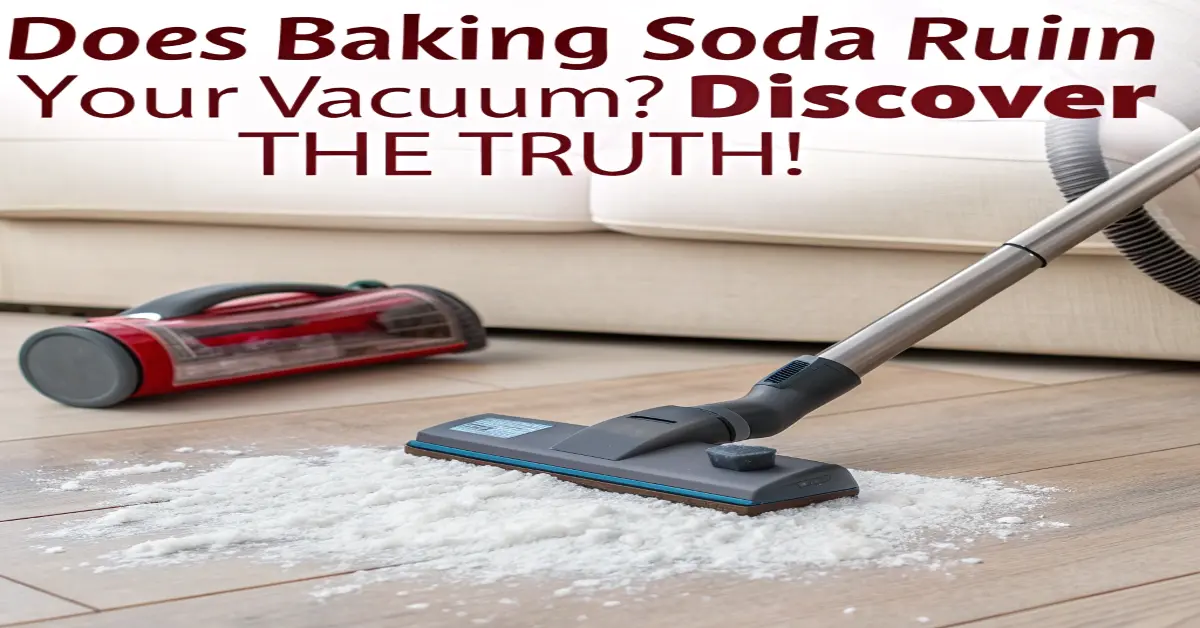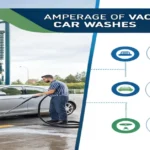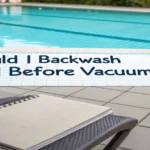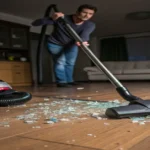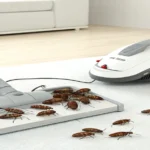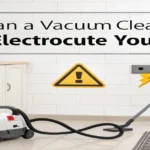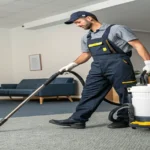If you’ve ever wondered, “Does baking soda ruin your vacuum?”, you’re not alone. Baking soda is often touted as a versatile cleaning agent, but using it improperly with your vacuum cleaner might cause more harm than good
Yes, baking soda can harm your vacuum by clogging filters and motors due to its fine particles.
Your box of baking soda that’s probably tucked away somewhere in your pantry — though it may seem innocuous enough — could be doing irreversible damage to your tried-and-true vacuum.
So, let’s get into this household controversy and set the record straight.
The Allure of Baking Soda: Why We Can’t Resist It
Come on, who doesn’t love a good natural cleaning hack? Baking soda is the darling of DIY cleaning enthusiasts, and it’s not hard to understand why.
It’s sitting right there in your kitchen, dirt cheap and apparently able to absorb those funky carpet odors that make us wrinkle our noses.
And its natural properties make it super appealing to chemical-fearing consumers in today’s world.
But here’s what your favorite cleaning influencer might not be telling you: that innocent-looking white powder could be causing more problems than it solves.
And trust me, I learned this the hard way after having to replace my own supposedly indestructible vacuum cleaner.
The Science Behind the Damage: What Happens Inside Your Vacuum?
Think about it this way: baking soda particles are like tiny ninjas. They’re so fine that they can slip through places they shouldn’t, kind of like that friend who somehow manages to squeeze through every crowd at a concert.
When you vacuum up baking soda, these microscopic particles don’t just disappear into the bag or canister – they embark on a journey through your vacuum’s internal components.
Here’s what’s happening inside your vacuum:
- The fine powder infiltrates beyond the primary filters
- These particles can accumulate in the motor housing
- Your vacuum’s suction power gradually decreases
- The HEPA filter becomes overwhelmed faster than normal
Warning Signs Your Vacuum Is Suffering
You might be thinking, “My vacuum seems fine!” But just like that small leak in your roof, the damage often isn’t obvious until it’s too late. Keep an eye out for these telltale signs:
Common Warning Signs:
- Unusual whining or straining sounds
- Visible dust escaping from vents
- Reduced cleaning effectiveness
- Frequent overheating
- Strange burning smell during the operation
The Financial Impact: When Pennies Saved Become Dollars Spent
Let’s talk numbers for a minute:
| Item | Average Cost |
| Quality Vacuum | $200-$500 |
| Professional Repair | $50-$150 |
| Filter Replacement | $20-$40 |
| Baking Soda | $1-$2 |
See the irony? Those few dollars saved on baking soda could end up costing hundreds in repairs or replacement.
As my grandmother used to say, “Being penny-wise can make you pound-foolish!”
Safe Alternatives That Work
Don’t worry – giving up baking soda doesn’t mean living with stinky carpets. Here are some vacuum-friendly options I’ve personally tested:
Natural Carpet Freshener Recipe:
Mix together:1 cup dried lavender1/2 cup cornstarch (not baking soda!)5 drops of your favorite essential oil2 tablespoons dried rosemary
The Right Way to Use Baking Soda (If You Must)
Look, I get it. Sometimes you’re just going to use baking soda anyway. If you’re determined, here’s how to minimize the risks:
- Use the absolute minimum amount necessary
- Let it sit for no more than 15-20 minutes
- Try to sweep up as much as possible before vacuuming
- Consider using a cheap backup vacuum for baking soda cleanup
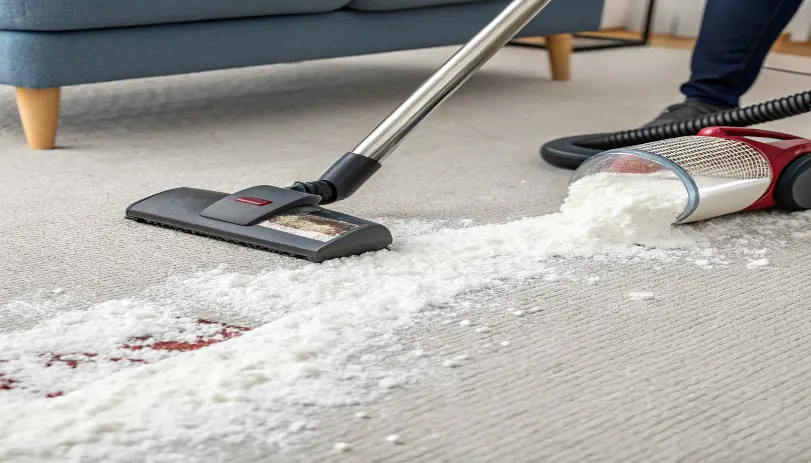
Professional Insights: What the Experts Say
I reached out to James Miller, a vacuum repair specialist with 20 years of experience, who shared this insight: “In my workshop, I can always tell when someone’s been using baking soda. The damage pattern is distinctive, and unfortunately, often expensive to repair.”
Long-term Carpet Care Strategies
Instead of reaching for that box of baking soda, consider these professional-recommended approaches:
- Regular professional deep cleaning (every 12-18 months)
- Investing in a quality carpet cleaning machine
- Using enzymatic cleaners for pet odors
- Implementing a no-shoes indoor policy
Myths vs. Facts: Setting the Record Straight
“Just because something is natural doesn’t mean it can’t cause damage. Water is natural too, but you wouldn’t pour it into your vacuum’s motor!” – Sarah Chen, Appliance Technology Specialist
Let’s bust some common myths:
Myth 1: A little baking soda can’t hurt. Fact: Even small amounts can accumulate over time.
Myth 2: Premium vacuums can handle it. Fact: Even high-end models are vulnerable to fine powder damage.
Myth 3: The filters will catch everything. F act: Some particles are fine enough to bypass most filtration systems.
The Hidden Risks of Baking Soda on Carpets
Most homeowners do not notice the significant dangers of using baking soda as a carpet deodorizer.
Baking soda’s small molecular structure allows it to penetrate far down into carpet fibers and cling there loose particles that need to be vacuumed.
Cleaning up crumbs after a baking day is one, but vacuuming it up comes with consideration of its safety on carpets.
Understanding How Baking Soda Affects Different Vacuum Types
Bagless vacuums and premium models like Dyson are particularly vulnerable to baking soda damage.
The fine dust can bypass filters and clog the intricate mechanisms inside. When too much baking soda gets into these systems, it can clump together, reducing suction power and potentially causing permanent damage to vacuum motors.
Moving Forward: Making Informed Choices
The key to maintaining both clean carpets and a healthy vacuum lies in finding the right balance. Consider these modern alternatives:
- Steam cleaning systems
- UV sanitizing vacuum attachments
- Activated charcoal deodorizers
- Professional-grade carpet shampoos
Frequently Asked Questions
Q: What if I’ve already used baking soda multiple times?
A: Don’t panic! Have your vacuum serviced and cleaned professionally to prevent further damage.
Q: Are there any vacuums that can safely handle baking soda?
A: While some industrial models claim to handle fine powders, it’s best to avoid the risk with any household vacuum.
Q: How can I deep clean my carpet without baking soda?
A: Consider steam cleaning, enzymatic cleaners, or professional services.Key
Points to Remember:
- Prevention is cheaper than repairs or replacement
- Natural doesn’t always mean safe for equipment
- Professional cleaning services are worth the investment
- Regular maintenance extends vacuum life
- Alternative cleaning methods can be just as effective
Final Thoughts:
How does your vacuum cleaner pay for the health of your home air? The appeal of fast, cheap cleaning hacks can be tempting, but safeguarding your vacuum will ensure that yours serves you for years to come.
However: sometimes the correct solution is non-obvious + that’s alright! Use this comprehensive guide to make the best choices possible for your carpet cleaning routine and safeguard your investment in your cleaning machines.
Share this with friends and family who might be unknowingly damaging their vacuums with baking soda – they’ll thank you later!

Hey, I’m Abdul Manan, a vacuum enthusiast with a knack for simplifying cleaning. I love sharing tips, tricks, and insights to help you get the most out of your vacuum. Let’s tackle cleaning the smart way!
